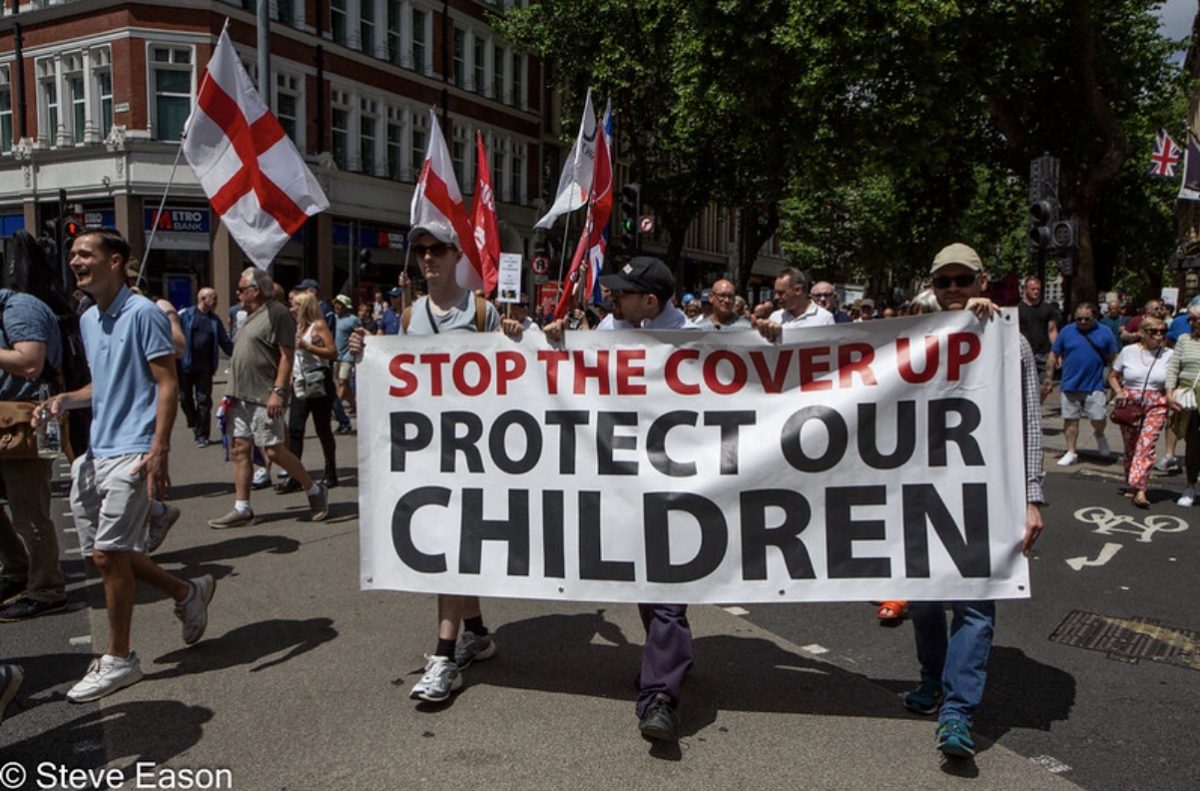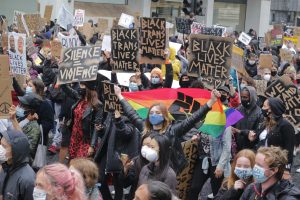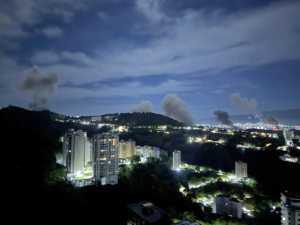
Responding to the racist moral panic
Colin Wilson •The nature of the threats from racism and fascism has changed in the last few years. Strategies to oppose them need to change too, argues Colin Wilson.
The current explosion of racism in Britain has centred on hotels used to house asylum seekers. Far from representing ‘voiceless’ local people, these mobilisations typically have far-right organisations at their core, and are backed by leading Tory politicians and the right-wing press. For months, the Telegraph has been full of predictions that ‘Britain is lurching towards civil war’ (3 April) or that the ‘white working class is a time bomb ready to explode’ (21 August). Robert Jenrick, positioning himself to take over as Tory leader and Leader of the Opposition, joined what he called ‘peaceful, patriotic protesters’ in Epping on 17 August. That evening, Jenrick attended a rally addressed by Callum Barker, a member of the neo-Nazi group Homeland.
The moral panic has spread beyond hotels. A Telegraph article headlined ‘Villagers verbally abuse Scouts they mistook for migrants’ (11 August) reported that people in the Welsh village of Newbridge circulated a video on Facebook which claimed to show migrants moving into a local Scout activity park. In fact, the people at the facility were Scouts from Scotland. The video claimed that police, who use the site to train dogs, were in fact guarding the supposed migrants. The video has since been taken down, but not before young people aged under 18 were subject to racist abuse as they got into a coach to leave the site.
These developments are very different from the most common forms of far-right organising we saw five or six years ago. Back then, we were looking for the most part at far-right marches in central London, joined by committed racists or fascists who had travelled to be there. Similar marches still happen today – for example, the 600-strong fascist march in Manchester on Saturday, 2 August. But we are now seeing many smaller protests, some of which have support in local communities.
If the protests themselves have changed, so has their political context. We have a Labour government, but far from breaking with Tory austerity, Labour continues loving up to big business. They have attacked pensioners and disabled people. NHS waiting lists remain at over 7 million. Labour delivers nothing for millions of people, some of whom are looking to Reform out of desperation.
Internationally, the political context includes the normalisation of far-right violence and racism, especially Islamophobia. Media as mainstream as the BBC accepts that the Trump presidency and the Israeli genocide of Palestinians are just how things are now. Israeli justifications for mass murder – claims which the vast majority of people in Britain simply don’t believe – are presented without comment as part of a performance of ‘balance’ or ‘neutrality’. Undisguised racism against Palestinians, Arabs, Muslims, and South Asians meets a non-response that suggests those people’s lives do not count as human lives – and this is echoed in the response to migrants in this country.
The most important change, however, in far-right organising is the way that racism is now openly linked with ideas about gender and sexuality. In other countries, this is far from new. Right-wing governments like that in Hungary have for ten years now provided generous grants and loans to the parents of new babies – part of the far-right concern to boost the birth rate and so prevent the mythical ‘Great Replacement’ of local people by immigrants. Trump began his first presidential campaign back in 2016 with the claim that migrants to the US were typically rapists. It’s an association of racialised people with rape – with attacks on vulnerable white women – which goes back to the racist myths about Black men, which led to lynchings in the US South.
In Britain, the racialised population most often accused of sexual violence against women is Muslims, a religion to which most asylum seekers are assumed to belong. Last summer’s racist riots were sparked by the rumour that the girls killed in Southport had been murdered by a newly-arrived migrant. Since then, the right has promoted claims about Muslim ‘grooming gangs’. On 5 August, Telegraph columnist Allison Pearson wrote a column headlined ‘Our corrupt elite is to blame for every sexual assault by an illegal migrant’ and which began ‘It is a fantasy to expect sex-starved men from misogynist cultures to respect our values and our women’. On 10 August, aspiring Tory leader Robert Jenrick wrote a Sunday Mail piece with the front-page headline ‘Top Tory’s fears for daughters over boat migrants’.
Migrants are regularly accused of major or minor wrongdoing in the right-wing press on the basis of little more than rumour (‘We heard one boy got his football stolen’, Telegraph, 14 August). There’s no possible doubt about Lucy Connolly, who, last summer as racists tried to set fire to hotels tweeted, ‘Mass deportation now, set fire to all the fucking hotels full of the bastards for all I care’, and who went on to plead guilty to inciting racial hatred. In the coverage of Connolly’s imprisonment, gender was again an issue – the Sun’s front-page splash celebrating her release was headlined ‘Mum’s home’, while her separation from her child was a constant theme in press coverage, as was her work as a childminder.
Connolly became a symbol of white motherhood under threat, while asylum seekers are depicted as predatory single men. In fact, one in six asylum seekers are children, with families often separated as they flee persecution, so that men are joined by other family members later. The anguish of asylum seekers separated from their partners or children, presumably no less than Lucy Connolly’s, is seldom mentioned.
In the right-wing imagination, Muslim men aren’t the only threat to vulnerable and implicitly white women and girls – trans women, typically referred to by the right as ‘biological men’, pose an equal danger. The biggest far-right mobilisation to date in South London, where I live, was not about migrants but opposed a local drag queen story time event because of the supposed danger to children. In the last few weeks, alongside migrant hotel stories, we’ve seen an extraordinary witch hunt against a transgender Marks and Spencer employee who did no more than ask a customer if they needed any help. The customer had come to the store to arrange a bra fitting for her teenage daughter. Still, press coverage falsely suggested that the trans woman was seeking to carry out the fitting and so transformed her into a sexual predator. JK Rowling joined in to call for a boycott of M&S. This is only the latest of press attacks on trans people, especially trans women, which have gone on literally every day for years.
If Muslims and trans people are a particular focus of these attacks, it’s clear that they can easily spread to other groups. On 20 August, it was reported that a couple in North Yorkshire were abused in the street and living in fear of further attacks after Olajuwon Ayeni, who is black, was filmed playing with his white grandchildren in the park. Tommy Robinson shared the video as evidence of sexual abuse. Attacks on trans people in the US are only the sharpest example of far-right policies on sexuality and gender, which have seen the banning of LGBT-themed books from school libraries and restriction on the availability of abortion.
The fact that race, gender and sexuality are linked like this has two implications for how we oppose the far right. First, we need to take on not just their racist ideas, but also their claims about trans people. We need to reject the idea that the main threat to children comes from ‘outsiders’, from people outside, implicitly white family homes, where they are safe. Most children are abused by someone they know, and almost half of the child sexual abuse reported to police takes place within the family – by parents, siblings, grandparents or someone else regarded as a family member. And for all the far right claims about protecting women and children, two out of five people arrested during last summer’s racist riots have been reported to the police for domestic abuse, including grievous bodily harm, stalking and coercive behaviour.
Second, we need to win an argument on the left that opposing the far right must include fighting transphobia and taking on other issues around gender and sexuality. Opposing oppression such as that experienced by trans people is of course the principled thing to do. But it’s also strategically crucial, because it’s the emotional power behind claims of abuse of women or children that builds support for right-wing mobilisations. Any left group which accepts transphobic ideas is undermining the fight against the far right.
At a time when fascist organising is on the rise, it’s important to remember the potential to increase the numbers organising against them. Hundreds of thousands of people have already come on the streets in recent years, such as the half million who marched for Palestine in May; the 100,000 who joined in London Trans+ Pride and the thousands who take part in local Prides; the 130,000 who participated in Black Lives Matter protests in 2020 and the 370,000 who joined Labour under Corbyn. The potential for undermining the far right’s toxic mix of racism with reactionary gender politics is huge, if we correctly understand the problem.







0 comments